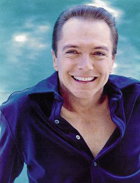
Death of a Teen Idol
November 30, 2017
By Thomas Dimopoulos
https://saratogatodaynewspaper.com

“I'll feel really good when it's over. I have an image of myself... I'm living on an island. The sky is blue, the sun is shining. And I'm smiling..." -- David Cassidy, Rolling Stone, May 11, 1972.
There were 20,000 of them, more or less, each seemingly armed with cheap, pocket-sized cameras crowned by four-sided cubes whose white flash burned your retinas with every image attempted to capture the teen idol on stage.
They had watched him, this crowd of mostly young girls, the past 18 months on TV - singing songs, driving the Partridge Family’s Mondrian-inspired bus - and bought millions of his albums, collected his trading cards, and carried to school lunchboxes bedizened with his image. And now here he was: live, in person, and on stage at the world’s most famous arena. It was a Madison Square Garden that had belonged to Ali and Frazier, Giacomin and Gilbert, Willis and Clyde. On this night, however, it was all about David Cassidy.
In 1972, a gallon of gas cost fifty-five cents, the average monthly rent was $165, and the annual household income about $12,000. It was a year that saw Crazy Joe Gallo gunned down at Umberto’s Clam House, five men arrested for breaking in to the Democratic National Committee offices at the Watergate Hotel and the gold medal achievements of Mark Spitz and Olga Korbut overshadowed when 11 Israelis, five guerillas and one police officer were killed in a 20-hour siege at the Munich Games.
Cassidy sang 15 or so songs, his 21-year-old torso coiling and squirming inside a white crepe jumpsuit and sending its fringe adornments reeling. “I’ll meet you halfway/ that’s better than no way,” he crooned. There were others: “I Can Feel Your Heartbeat,” and “Cherish.” “I Woke Up In Love This Morning,” and “Doesn’t Somebody Want To Be Wanted.” At Madison Square Garden, his TV/ real-life mom Shirley Partridge Jones sat in the first row.
My dad - then a youthful man in his thirties whose land of origins had given birth to 300 Spartans who did battle at Thermopylae and who as a child had escaped the Nazi plunder of his village – shook his head in disbelief at the commotion and plugged fingers into his ears to attempt to mute the shrill shrieks of teen-girl idolatry caterwauling down from the blue seats that called David’s name. It was a cacophonous chorus that my sister, six or seven years of age at the time, willingly joined. The sound of the screams rang around in your head for several days after.
Cassidy was a frequent summer visitor to Saratoga Springs. You’d run into him at the racecourse, or coming out of the Wilton Mall cinema, or at Fasig-Tipton - where he bought his first yearling in 1974. In 2001, he purchased a house in Saratoga Springs. It was a Monday night in August seven years later when he stood up in front of 250 people at a fundraising gala for The Alcohol and Substance Abuse Prevention Council at the Hall of Springs and publicly announced, for the first time, that he was an alcoholic. The revelation, which was unexpected, left some in the audience stunned.
“I was in denial about it, and the problem was getting worse,” said Cassidy, his wife Sue and his son Beau at his side. Cassidy talked about his genetical link to his own father, the actor Jack Cassidy. “Bipolar, manic-depressive, alcoholic and a genius,” he told the audience.
Wife Sue said she was proud of her husband for having the courage to publicly share such a personal experience. “Seeing him up here and telling you all this is one of the greatest things that I could ever hope to be able to be a part of,” said 17-year-old Beau.
Cassidy acknowledged that the location of the Hall of Springs, sitting as it does adjacent to the Saratoga Performing Arts Center, created an interesting juxtaposition that merged the past and the present; a time for new beginnings to lead into the future.
“This is my favorite place in the world. ... I played here in '72, '73, '74,” Cassidy remembered. “What was ironic when I drove up, was that I realized this journey has been going on for so many years. And the journey is now. Every day, 24 hours, to stay sober.”
You got the feeling on that August night in 2008 that what stood before you was a person at a the flashpoint of their own existence, burning white-hot as the flash residue of 20,000 cameras all those years ago. You got the feeling, that night in 2008, that things could go either way. It did not go well. What followed was a series of drunken driving charges, a divorce from wife Sue Shifrin after more than 20 years of marriage, and Cassidy’s revelation earlier this year that he’d been diagnosed with dementia and was struggling with memory loss.
Shortly before Thanksgiving, he was admitted to a Florida hospital, reportedly with multiple organ failure. Time was running out. For millions of people who were born, say, between 1960 and 1965, the sadness of confronting their own mortality comingled with the childhood innocence of youthful dreams. “Prayers please,” Sue Shifrin Cassidy wrote Nov. 18 on Twitter. Nov. 19: David is still with us. Keep praying. Nov. 20: Critical but stable. Nov. 22: God was in that room tonight. Point him in the direction of... heaven. RIP.
